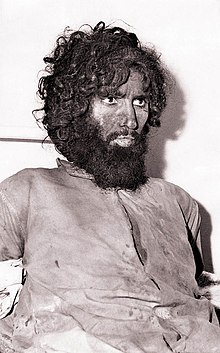Juhaimān al-Taibī
Juhaimān al-ʿUtaibī ( Arabic جهيمان العتيبي, DMG Ǧuhaimān al-ʿUtaibī ; * September 16, 1936 in Qasim ; † January 9, 1980 in Mecca ) was the leader of the attack on the Great Mosque in Mecca in November 1979 .
Life
Born into a Bedouin family in the central Arab province of Qasim , he served in the Saudi Arabian National Guard from 1955 . In 1973 he finished his service and attended the Sharia Faculty of the Islamic University of Medina , where he also attended lectures by Sheikh Ibn Baz . During this time he wrote pamphlets such as the Law of Loyalty and Submission: Corrupt Government or Sabaʿ Rasāʾil ( Seven Letters ), which were later printed in Kuwait and distributed as leaflets in Saudi Arabia . His theology studies centered in particular on the end of the world, and he was able to win many followers for his revolutionary ideas.
In 1974 he fell out with Ibn Baz and returned to Qasim and Najd with some of his followers. There he spent two years building the Ichwan, a militant group.
In 1976 the group moved to Riyadh , where they were caught by the Saudi security forces during a demonstration against the monarchy and arrested. However, Sheikh Ibn Baz released her after questioning.
Juhaiman al-Utaibi was married to both the daughter of Prince Sadjir al-Mohaya and the sister of Muhammad ibn Abdullah al-Qahtani .
Raid on the Great Mosque
On the morning of November 20, 1979, a group of up to 500 heavily armed radical Muslims from various Arab countries, led by al-Utaibi, stormed the Great Mosque and took more than 50,000 assembled believers hostage. It was the last day of the pilgrimage month and the day before New Year's Day in 1400 according to the Muslim calendar. The insurgents, driven by eschatological ideas, declared that the end of the world was imminent and called for the adoption of Islamic legal systems in all Muslim countries, the overthrow of the Saudi royal family and a break in diplomatic relations with Western states.
Most of the hostages were soon released, but some remained in the hands of the insurgents. Only after the Saudi government had obtained a fatwa from the top theologians that allowed the use of force in the holy city, and after lengthy and costly battles in the labyrinthine building, after more than two weeks of occupation, the surviving rebels succeeded in surrendering. A total of 330 people, including hostages, hostage-takers and emergency services, were killed in the occupation. In a mass execution in several cities in Saudi Arabia on January 9, 1980, 63 insurgents, including al-Utaibi, were publicly beheaded .
literature
- Florian Peil: It all started in Mecca . Die Zeit , 7, 9 February 2006, p. 90 ( Memento in the Internet Archive )
- Florian Peil: Uprising in Mecca. The occupation of the Great Mosque in 1979 . Klaus Schwarz, Berlin 2006 ISBN 978-3-87997-639-3 (also Magister-Arb. FU Berlin 2004)
Individual evidence
- ^ Gudrun Krämer: Good Counsel to the King: The Islamist Opposition in Saudi Arabia, Jordan, and Morocco . In: Joseph Kostiner (Ed.): Middle East Monarchies: The Challenge of Modernity . Lynne Rienner, Boulder, CO 2000, ISBN 1-55587-862-8 , p. 262.
- ^ Douglas F. Graham, Peter W. Wilson: Saudi Arabia: The Coming Storm . ME Sharpe, Armonk, NY 1994, ISBN 1-56324-394-6 , p. 57.
- ↑ Andreas Förster: The blood trail of terror. In: SPIEGEL ONLINE . January 7, 2016, accessed August 27, 2018 .
| personal data | |
|---|---|
| SURNAME | ʿUtaibī, Juhaimān al- |
| ALTERNATIVE NAMES | Uteibi, Juhaiman Ibn Seif al-; Otaybi, Juhayman al- |
| BRIEF DESCRIPTION | arab soldier; Islamist and leader of the raid on the Great Mosque in Mecca |
| DATE OF BIRTH | September 16, 1936 |
| PLACE OF BIRTH | Qasim |
| DATE OF DEATH | January 9, 1980 |
| Place of death | Mecca |
